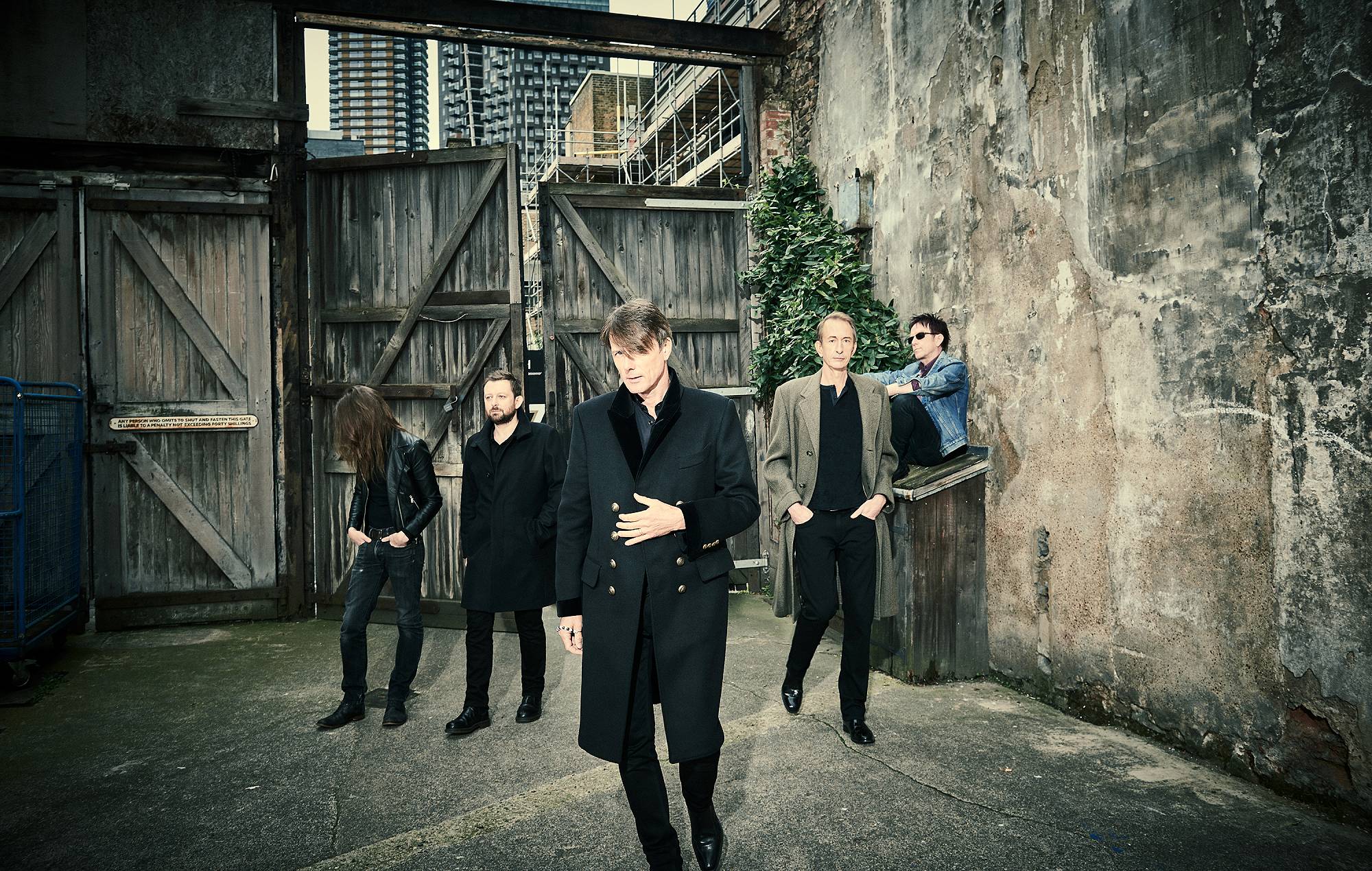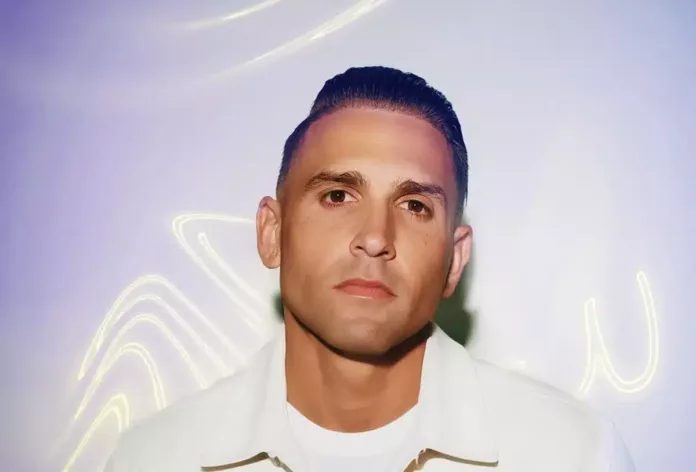
Suede: “I’d love to think that our most daring work is ahead of us”
NME meets Suede at The Social in the heart of central London. An indie haven hidden from the bustle of Oxford Street, it’s a spot that has seen some of most exciting names in guitar, pop and club culture grace its stage, or just come to hang out, over the years.
“I used to come here a bit in the ‘90s when it first started,” replies bassist Mat Osman. “They used to have club nights down here; I’ve been to a few book things here, too. It seems to have aged quite gently, The Social. Every time I come down there are people reading.”
Frontman Brett Anderson then simply offers: “I don’t do nights out any more; I do days out.” Osman adds: “All of the places that we used to go have all been knocked down, actually. It’s a weird kiss of death. There’s basically a wrecking ball following us!”
Perhaps that’s why, then, that the indie veterans’ acclaimed ninth album ‘Autofiction’ provides them with a place of their own: an imagined sweaty garage or teenage bedroom to relive their punk dreams and remain forever young.
NME sat down with Anderson and Osman for the latest instalment of our In Conversation series to discuss starting over, what could be next for the band, and who’d play their former manager Ricky Gervais in the Suede biopic.

NME: You said your last album ‘The Blue Hour’ was in the more experimental edges of what you do. What made you want to come back with something more direct in ‘Autofiction’?
Brett: “The idea was for this record to have the feel of a live record. The last two were increasingly odd and left-field. We wanted to come back with a primal howl of a record.”
Mat: “We [initially] had this idea that we’d do a really old-fashioned live album where we get fans down to watch us recording it, have it half-gig and half-recording session – to really try and capture that feeling of a Suede gig. Then everything happened and you couldn’t see anyone any more. We still wanted to make a record that felt like that, but had to do it as the five of us geeing each other on.”
You even teased the idea of becoming a new band for this record… [Suede later played ‘Autofiction’ in full at London’s Moth Club as the fake band ‘Crushed Kid’]
B: “In a funny way, as you get older you need to re-learn and re-remember what it’s like to be a new band. You can slowly drift away from those starting points and that exciting energy. We wanted to grab some of that back.”
M: “Every now and then we’ve been forced to burn everything down and start again. ‘Coming Up’ [1996] was like that, ‘Bloodsports’ [2013] was like that. We’ve done it before and it has led to an exciting record. This was one of those things where we almost forced it.”
B: “Artists are often searching for the naivety that they had at the start. That’s the journey that Picasso had – going into naïve artforms and away from representation. If you’re around long enough, then you’re going to go through these journeys and want to rediscover these things. There’s nothing as viscerally exciting as playing rough rock music.”
Would you have considered inviting your old manager Ricky Gervais back for these gigs as a ‘new band’?
M: “Poor Ricky! That was just a tiny little slither of time!”
B: “It’s one of those things that has been inflated out of proportion.”
M: “He had a million other things to do badly while he was badly managing Suede. So no, it wouldn’t have taken his particular brand of magic.”
So he’ll only get a few seconds in the inevitable Suede biopic?
M: “Yeah, we’ll get him in to play himself!”
Before the last record, you were very clear that ‘The Blue Hour’ was the last part of your comeback trilogy…
B: “Were we? That was very forward-thinking of us! You just go where it feels right. It’s a bit of a pendulum thing: as a rock band, you don’t have a million options like you would as a solo artist. There’s much more momentum with a rock band, but less manoeuvrability. The pendulum is always going to swing back to the grubby, noisy, punky world that we came from. That’s what this record is.”
You said that ‘The Blue Hour’ was set in ‘Suedeworld’, a dark place among the B-roads of fly-tipped rubbish, chain link fences and dead badgers. Where is ‘Autofiction’ set?
B: “If it’s anywhere physically, it’s a rehearsal room in Hackney. I didn’t want to set it geographically anywhere. ‘The Blue Hour’ is specifically set in a slightly tatty, rural setting. This time, I wanted it to be more of an emotional landscape, or a teenage bedroom.”
So ‘Suedeworld’ can move?
B: “I think of ‘Suedeworld’ as a field, and it’s our job to try and move the fence as far out as it can go. You can’t just jump over the fence and go to another field, because the other field is hip-hop: we can’t go there. You can expand where ‘Suedeworld’ is. This is a more familiar place, but I wouldn’t have done it if there wasn’t a freshness. It’s a rock album, but it’s a different sort of rock album.”
Do you see punk as more of an energy than a sound?
B: “It was one of the first things I said about this album: I said it’s ‘our punk record’, not ‘a punk record’. It’s not an attempt at aping a genre because that would be totally pointless, but it is interesting when bands take the spirit of a genre and put it through the filter of themselves. This is still definitely a Suede record, but it’s got that spirit, energy, joie de vivre and messiness. In that sense, it’s a punk record. If you want to get technical, it’s probably more of a post-punk record.”

Brett, having written two memoirs, Coal Black Mornings and Afternoon With The Blinds Drawn, has analysing and revisiting your life impact on the lyrics of this record?
B: “I think it did. They’re supposed to be songs about me, my mental and emotional state. The reason I liked the title ‘Autofiction’ [is because] it was more a mixture of memoir and fiction. It was a neat title for a record because all art sits on that spectrum. On one end you have the word ‘truth’, and at the other end you have the word ‘fantasy’. No art is 100 per cent truth and no art is 100 per cent fantasy. Even Lord Of The Rings contains human truths. Every song that’s ever been written sits on that line somewhere.”
And what truth do we learn about you?
B: “I wanted to get inside my head as a 54-year-old man. I didn’t want to make a rock record trying to be a 25-year-old man – I made three of those. I wanted it to be an honest snapshot of where my head is at, and for it not to be a particularly cosy and warm experience. There’s a tendency to believe that as you age you become safer: I don’t see life getting safer. In certain ways it does in that you have stability in certain aspects of your life if you’re lucky, but there’s also fear and paranoia. As you get older and plummet towards death, there’s a fear of illness and dying. There are elements of anxiety that I wanted to bring out.”
Is this the start of a new era for Suede?
B: “I don’t know. The next record that we’re planning to write, and have already started, is much more experimental. I don’t really know if there’s an arc with [‘Autofiction’]. I’m not seeing it as a selection of albums. You just have to do it one at a time, really. I do think of those three records as [being] together, especially ‘Night Thoughts’ and ‘The Blue Hour’, but the next record will be completely different.”
So the pendulum could swing back to Suede at their most experimental?
B: “Totally. I’d love to think that our most daring work is ahead of us. That’s a really exciting prospect – that a band at our stage of our career haven’t just settled for running through the motions. I love making new records: it makes my heart beat faster, it’s what I get up for in the morning.”
Suede’s new album ‘Autofiction’ is out now. The band will embark on a North American tour with Manic Street Preachers in November, before returning to the UK in 2023.



